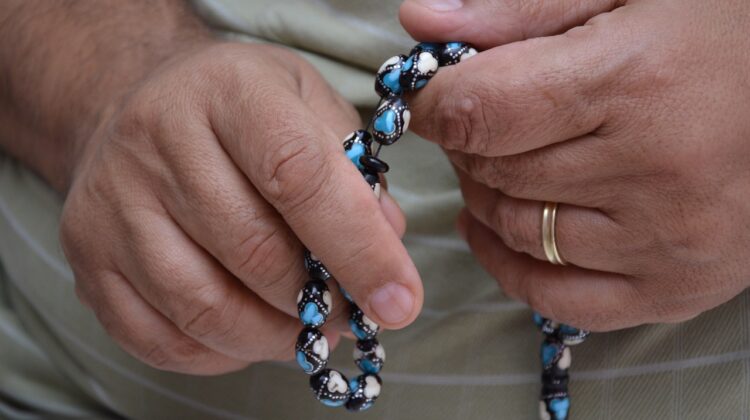One of the most familiar benedictions of the Christmas season is the angelic message delivered to the shepherds outside of Bethlehem:
Glory to God in the highest,
And on earth peace, goodwill toward men! (Luke 2:13–14)

We gaze fondly at the shepherds in family creches and in Nativity icons, and that ethereal peace feels holy and poetic—a heavenly ideal. But on a personal level, where we work out our salvation in the midst of fractured relationships, those ideals of peace and goodwill can seem hopelessly out of reach.
The light of the Christmas season brings warmth, but it can also shine a harsh spotlight on our own areas of darkness. Many of us are experiencing significant pain and brokenness in our families. At this moment, people I love and admire are dealing with recent divorces, impending divorces, and the multiple-household juggling of long-ago divorces. Parents of small children are struggling to find ways to honor abusive or disinterested grandparents while also protecting their own children. Adult children have distanced themselves from the family, geographically and emotionally, while nursing grudges. Siblings refuse to speak to each other or even occupy the same room.

Now it’s mid-December, and we try to rejoice in the coming Nativity of our Lord while engaging in U.N.-level diplomatic negotiations among warring family factions. As followers of Christ we inwardly long for that elusive peace and goodwill, but outwardly we paste smiles on our faces while family members criticize our life choices and mock our faith.
Even in those sprawling, messy, eccentric families full of people who love each other imperfectly but sincerely, the mythical Dickensian, happily-ever-after Yuletide doesn’t exist. Cancer strikes. Tragic accidents leave empty chairs at the dinner table. Beloved grandparents fade away into dementia.
And the pain of sins and weaknesses, our own and others’, feels more acute during this time—a season when wounded people (translate, “you and me”) traditionally gather together.
As I think about the relational struggles we all experience in varying degrees, I turn once again to the wisdom of the Church, collected in Scripture and in the words of the saints. For this post I have collected some life-giving words from those who have run the race before us, suffering and ultimately being transformed in Christ. My own words are mere filler, but their inspired messages have helped me to navigate painful situations in my own life and to find a path to forgiveness and, hopefully, growth in Christ.
If you’re experiencing a blue Christmas, I hope you will find their insights helpful too.
Christmas Would Be Great Except for the People
It is easy to love the people far away. It is not always easy to love those close to us. It is easier to give a cup of rice to relieve hunger than to relieve the loneliness and pain of someone unloved in our own home. Bring love into your home, for this is where our love for each other must start. — Mother Teresa of Calcutta (+1997)

Ain’t that the truth. “Peace on earth” is a warm, fuzzy abstraction; practicing peace in our own families is a spiritual battle. And yet God longs to work in us—not in spite of our struggles with family, but in the midst of them.
Daily life, cohabitation, marriage (pulling a yoke together), and life in general of the “home church” refines character, broadens a narrow heart, and teaches that without love in Christ and effort, family life is merely resting on loose and fragile foundations and is easily in danger of being lost from moment to moment. — St. John Chrysostom (+407)
These relational struggles, including family tensions, are included in St. Paul’s affirmation that “all things work together for good to those who love God, to those who are the called according to His purpose” (Romans 8:28).
Even when I am trying my best to be a peacemaker while others continue to do wrong? Yes. Again and again the Fathers teach that if we humble ourselves before God, anything and everything can work for our salvation.
A Spiritual 2×4 Upside the Head
I’ll admit it: I’m a whiner. I want the blessings, the mystical mountaintop experiences, and not all the messiness in the valleys of life.

The way of following Christ is not always strewn with rose petals. It is often an uphill climb, narrow, sorrowful, thorny, adventurous and filled with many tribulations. It is not, my brothers and sisters, a journey of ease, security, rest, honor and glory. It is—rather, my beloved—a way of martyrdom that is sometimes annihilating. It demands the taking up of the personal cross of a harsh daily routine of abstinence, exile, denial, obscurity, scorn, derision and poverty. It is indeed a way of martyrdom that leads to the hill of Golgotha. — Monk Moses the Athonite
Or, as St. Theophan the Recluse bluntly stated, “Throw out of your head the idea that you can, through a comfortable life, become what you must be in Christ!”
I should know this by now. Yet I am shocked—shocked!—when I experience setbacks. Painful situations don’t disappear with one quick prayer of “faith” (defined as my confidence that God will resolve things my way, on my timetable). When I think about the struggles and disappointments in my life, I realize that these are the things that turn my heart back to God and allow me to become more like Christ. I don’t enjoy those struggles, but knowing that God works in them for His purposes gives me hope. The broken relationship may not heal, but God can change me.
It is useless to accuse those around us and those who live with us of somehow interfering with or being an impediment to our salvation and spiritual perfection… Spiritual or emotional dissatisfaction comes from within ourselves, from inexperience and from poorly conceived opinions we do not want to abandon, but which bring on doubt, embarrassment, and misunderstanding. All of this tires and burdens us, and brings us to a sorry state. We would do well to comprehend the Holy Fathers’ simple advice: If we will humble ourselves, we will find tranquility anywhere, without having to mentally wander about many other places, where we might have the same, or even worse, experiences. — St. Ambrose of Optina (+1891)
Despite my best efforts, I can’t change the brother who bullies family members with his political opinions at the dinner table or the angry adult child who refuses to answer texts and phone calls.

However, I do have control over my own thoughts and actions. And in the centuries of wisdom preserved in the Scriptures and in the Church, I’ve noticed three recurring themes (among many) about our relationships: learning to see people as God sees them, taking a hard look at myself, and choosing the path of forgiveness.
Seeing Others as God Sees Them
Yes, I’m talking about that overbearing brother. And the aunt who, after one too many glasses of wine, begins telling everyone what she really thinks about their parenting skills. And especially the father who abandoned the family long ago. As followers of Christ, we are commanded to love one another and to see others, including the maddening relatives, with humility and love: “in lowliness of mind let each esteem others better than himself” (Phil. 2:3). We cannot do this if we see only the offensive behavior and not the person.
Never confuse the person formed in the image of God with the evil that is in him; because evil is but a chance misfortune, an illness, a devilish reverie. But the very essence of the person is the image of God, and this remains in him despite every disfigurement. — St. John of Kronstadt (+1909)
Father Daniel Sysoev states this idea poetically: “Love has perfect eyesight: it sees the truth in a person, and it distinguishes the sin from the sinner” (How Can I Learn God’s Will?, p.8).
This habit of looking past the behavior, seeing the person who is deeply loved by God, takes faithful practice and vigilance over our thoughts. Yet I have found no more effective cure for judging others than seeking to understand them.

Jesus said,
But I say to you who hear: Love your enemies, do good to those who hate you, bless those who curse you, and pray for those who spitefully use you (Luke 6:27-28).
Jesus doesn’t merely ask us to refrain from catty retorts or to practice a cool civility; He calls us to an active response of love—finding opportunities to do good things for hateful people, to bless them with our gentle words and acts of kindness, and to pray for them continually.
Compassion for others and sympathy for their failings will bring the heart closer to the heart of God than any form of judging. — St. Hesychius the Presbyter (late 5th c.)
St. Ignatius Brianchaninov (+1867) expands on this idea:
Speak well of those who speak evil of you. Pay good for evil. Pray for those who cause you various offenses, wrongs, temptations, persecutions. Whatever you do, on no account condemn anyone; do not even try to judge whether a person is good or bad, but keep your eyes on that one evil person for whom you must give an account before God—yourself.
When I start feeling judgy toward someone who has offended me, that judgment always, always gives birth to feelings of self-righteousness. Because of course I would never do the selfish thing that he did. I would never say the cruel things that she says. Right?
Maybe, maybe not. But I am perfectly capable of saying and doing plenty of things to cause rifts in relationship and pain to others. I justify myself, and I am blind to my own faults. Remember the pre-communion prayers? We ask forgiveness for sins “voluntary and involuntary, in word and deed, known and unknown.”
Yet Another 2×4 Upside the Head: Looking Inside
Elder Ephraim of Arizona, who recently entered into eternity (Dec. 7, 2019), wrote,
Sometimes we find ourselves at odds with another person, and we stubbornly insist: “He is at fault. He’s the one who became angry. He’s the one who spoke to me rudely. He must humble himself. If he had spoken to me calmly and addressed me with respect, I would have been patient and not have been offended. Hence, he is to blame!” We must oppose such thoughts by responding: “No, no! If I did not have egotism, I would not be bothered. Hence, I am to blame. My brother is not at fault.”
Ouch.
Choosing to love the difficult people in our lives, to value them, and to pray for them continually, is simply to live as Jesus did.
Do not cast off brotherly love lightly, for there remains no other way of salvation for human beings. Observe yourself with care, and see if the evil, which separates you from your brother, has its cause, not in him, but in you; and make haste to be reconciled with him, lest you transgress the commandment of love. Do not despise the commandment of love, because—through it—you will become a son of God; whereas, when you transgress it, you become a son of Gehenna. — St. Maximos the Confessor (+662)
The Path of Forgiveness
When we have been deeply wronged, with no restoration in sight, I think it’s humanly impossible to forgive without God’s grace. In volatile situations, such as dealing with an ex-spouse who is more interested in “winning” than in doing what is best for the children, or striving for a mutually respectful relationship with an unstable parent, it is easy for resentment to control our lives. After all, demonstrable wrongs are being committed. Yet judgment and anger lead us away from the God whose love we so desperately need. Jesus warned of the dangers of unforgiveness in the Parable of the Unforgiving Servant (Matt. 18:21-35).
But when I, with God’s help, try to see others through His eyes and also remember my own sins and failings, I am more prepared to obey Christ’s command to forgive. After all, He forgave me and endured far worse than anything I’ve experienced.
No one spits on you, no one even strikes you, no one crowns you with thorns, and the rest. Christ the Lord endured all these things with great meekness and long-suffering. For whom? For me and for you, His unworthy servants. And not only did He endure all this, but He also prayed for His enemies, “Father, forgive them” (Luke 23: 34). Look on this patience as in a mirror and consider, and you will no doubt forgive your neighbor. — St. Tikhon of Zadonsk (+1783)

Elder Ephraim of Arizona wrote something that applies directly to uncomfortable gatherings at Christmas:
Put up with that person who grieves you and creates temptations. Put up with him joyfully. Pray for him every day. Always try to do good to him, to commend him, to speak to him with love, and God will work His miracle and he will reform. Then our Christ will be glorified, and the devil, who sets up all the stumbling-blocks, will be foiled. Force yourself especially to stop criticizing and lying.
I can put up with someone, but the “joyfully” part really gets to me. It feels like another impossible challenge from a God who, working in us, enables us to “do all things through Christ who strengthens me” (Phil. 4:13).
Among your religious duties is that of loving your fellow men and always forgiving them. If you do this, you will be filled with joy, and with health both of the soul and of the body. — St. Raphael of Lesvos
There it is again—that assurance of joy. Even when the relationship doesn’t improve, year after year, and I have prayed and struggled, still I am called to forgive. Again and again, seventy times seven times.
And sometimes—not always, but every now and then, miraculously—when we change our attitudes, the people around us change.
But…Maybe This Christmas, Things Will Be Different
It’s possible. Miracles do occur in broken relationships, every day of the year. Our God is a God of reconciliation, who can “turn the hearts of the fathers to the children, and the hearts of the children to their fathers” (Malachi 4:6). Knowing when and if broken relationships will be mended is beyond our understanding, complicated (on the earthly side) by all that free will going around. But our job is to keep praying.
Do not grieve if you do not at once receive from God that which you ask. He wishes to benefit you still more by making you persist longer in your patient prayer before Him. For what can be higher than to address one’s converse to God and be in communion with Him? — St. Nilus of Sinai (+430)
I know parents who have prayed for decades for children who are far from Christ and have drifted away from His Church. Some are still praying; others have experienced the joy of their prodigal children returning. Regardless of outcome, this practicing of the virtues—valuing others and demonstrating patience and love—starts within our hearts then mystically affects those around us.
Whoever carries within himself the peace of the Holy Spirit brings peace to others as well; and who carries with him an evil spirit brings evil to others. The soul that has experienced God wishes always to see Him within itself, for He enters quietly, and brings peace to the soul, and witnesses salvation without words. — St. Silouan the Athonite (+1938)
In my own little circle, I am waiting, hoping, praying for change in many situations. And during this long season of hoping (and sometimes despairing), I am learning to continue to pray and also to seek the love of God in my life. I can’t do much, but I can do that.
Do not fight to expel darkness from the chamber of your soul. Open a tiny aperture for light to enter, and the darkness will disappear. — St. Porphyrios Kapsokalyvite (+1991)

Thank you for this. It’s refreshing to read an article that relates to the “real” world and situations taking place in our families. I personally am struggling with a few of things you mention and it often times exhausts me to the point of despair and fear. A terrible place to be. Prayer is the only answer and trying to see the good in every person is what I strive for as difficult as it may be . Merry Christmas.
L
I’m so sorry, Lisa. May God fill those empty places. And a very late Happy New Year to you!
Ouch!
Some painful truths presented here. But, ones we need to hear. (me especially)
I am trying to do better, but I’m still quick to judge and argue with “wrong” family and friends during gatherings. When really the only one wrong, is me. Thank you for this medicine.
Where’s that spoonful of sugar? I know I set it down somewhere… 🙂
I love that St Porphyrios quote!! It’s so beautiful. Thank you for this very realistic and encouraging article!
You’re welcome!
Than you for writing this. I have a Confession time today, and this makes an excellent way to reflect on where I have “ missed the mark”.
You and me both! I re-read the Fathers’ wise words more than once. 🙂
Thank you for this it was encouraging to me.
I’m so glad!
Amen!
I think every Christmas gathering in our family has some major blow up along the way, usually due to inadvertent offense given by another. Sometimes these blow ups are smoothed over, sometimes they cause an early end to the festivities. But there is a person at our church who is 1 of 5 adult siblings, and so rancorous are the family divisions that they haven’t gotten together in decades. Love is hard with family sometimes.
That is so sad! And I didn’t even explore the issue of taking offense instead of giving grace. Sheesh!
Thanks to all who commented. I was sick over much of Christmastime and didn’t have a chance to respond. I hope all of you felt God’s grace and presence even in the midst of the holiday challenges!